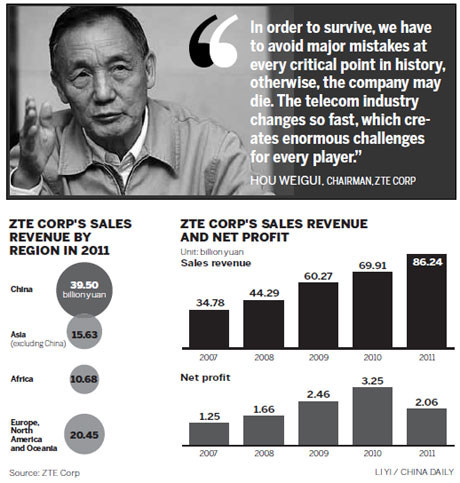ZTE sets sights on leading global role
Updated: 2012-08-30 09:20
By Shen Jingting (China Daily)
|
||||||||
Iconic chairman reveals secrets of company's success amid downturns in world telecom sector
ZTE Corp has the potential to become one of the world's top three telecom equipment makers by surpassing Nokia Siemens Networks and Alcatel-Lucent SA in terms of sales but it still needs time, according to Hou Weigui, its chairman.
Hou, 70, who founded Zhongxing Semiconductor Co Ltd, the predecessor of ZTE, in China's southern coastal city of Shenzhen in 1985, has seen his company grow from being virtually unknown to becoming a top league player in the world's telecom industry.
|
 Telecom technologies on display at an international exhibition in Beijing. ZTE Corp is the world's fifth-largest telecom equipment supplier by sales. [Photo/China Daily] |
Despite slow spending in telecom infrastructure by worldwide telecom carriers, ZTE's revenue achieved year-on-year growth of 23.4 percent - the highest among all industry rivals - to 86.2 billion yuan ($13.58 billion) in 2011.
The company is the world's fifth-largest telecom equipment supplier by sales, behind Telefon AB LM Ericsson, Huawei Technologies Co Ltd, Alcatel-Lucent and Nokia Siemens Networks.
"ZTE presented a strong development momentum," said Hou, in an interview with China Daily. Although it is good to see ZTE expanding rapidly, he said the company would be cautious about sacrificing too much short-term interest for market share.
"ZTE's core target is to maintain a healthy growth, which demands that we balance the company's cash flow, profit and scale ... Slowly but steadily, we will overtake them (Alcatel-Lucent and Nokia Siemens Networks)," Hou said.
Nokia Siemens Networks realized net sales of 14.04 billion euros ($17.57 billion) in 2011, while Alcatel-Lucent's sales were down 2.1 percent to 15.3 billion euros last year.
Reasons behind success
Hou is regarded as an iconic business figure in China. He shared fame with other pioneer Chinese entrepreneurs who emerged after the launch of the country's reform and opening-up. They include Liu Chuanzhi, the founder of Lenovo Group, and Ren Zhengfei, president of ZTE's cross-town rival - Huawei Technologies Co Ltd.
Compared with Ren, who is said to be "tough" and "mysterious" and who turns down all media interview requests, ZTE's Hou is mild, modest and quiet and occasionally communicates with the media. Whenever he attends the World Mobile Congress or pays a visit overseas, Hou always adopts a Zen-like approach when dealing with people.
|
 |
He usually flies economy class and leads a simple life. Some describe him as a workaholic. He spends one-third of his time every year traveling to different countries in the hope of learning from customers.
Analysts said Huawei and ZTE, both Shenzhen-based, demonstrate different styles of doing business: The former is aggressive; the latter is much milder. It can be said they reflect their founders' personalities.
"Both Huawei and ZTE were founded in the 1980s but were tiny through to the late 1990s. In the interim, foreign vendors were the incumbents," C.W. Cheung, Asia-Pacific consulting director of technology at the research firm Ovum Plc, wrote in an e-mail to China Daily.
"Over the last 10 years, though, Chinese vendors have become dominant in many sectors domestically and, for Huawei, ZTE and others, increasingly international as well," he added.
When Hou recalls the past, he concludes that it was because ZTE did the right things at the right time so that the company achieved rapid development. "In order to survive, we have to avoid major mistakes at every critical point in history, otherwise, the company may die," he said. "The telecom industry changes so fast, which creates enormous challenges for every player."
First, the company should have good judgment in terms of strategy. It has to avoid putting resources in short-lived technologies. In addition, the company should not conduct mergers and acquisitions blindly, which wastes money, he added. "Then the company should be sensitive to market trends and respond to them."
Rising from downturns
ZTE, which listed on the Shenzhen Stock Exchange in 1997 and in Hong Kong in 2004, increased its total sales from 9.3 billion yuan in 2001 to 86.3 billion yuan in 2011.

 Relief reaches isolated village
Relief reaches isolated village
 Rainfall poses new threats to quake-hit region
Rainfall poses new threats to quake-hit region
 Funerals begin for Boston bombing victims
Funerals begin for Boston bombing victims
 Quake takeaway from China's Air Force
Quake takeaway from China's Air Force
 Obama celebrates young inventors at science fair
Obama celebrates young inventors at science fair
 Earth Day marked around the world
Earth Day marked around the world
 Volunteer team helping students find sense of normalcy
Volunteer team helping students find sense of normalcy
 Ethnic groups quick to join rescue efforts
Ethnic groups quick to join rescue efforts
Most Viewed
Editor's Picks

|

|

|

|

|

|
Today's Top News
Health new priority for quake zone
Xi meets US top military officer
Japan's boats driven out of Diaoyu
China mulls online shopping legislation
Bird flu death toll rises to 22
Putin appoints new ambassador to China
Japanese ships blocked from Diaoyu Islands
Inspired by Guan, more Chinese pick up golf
US Weekly

|

|






